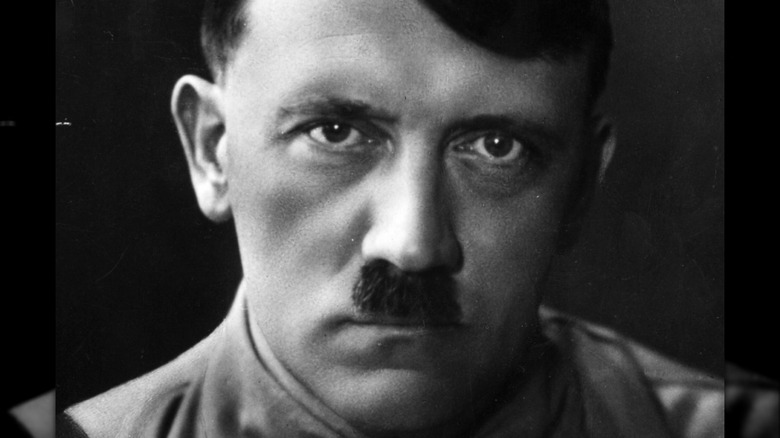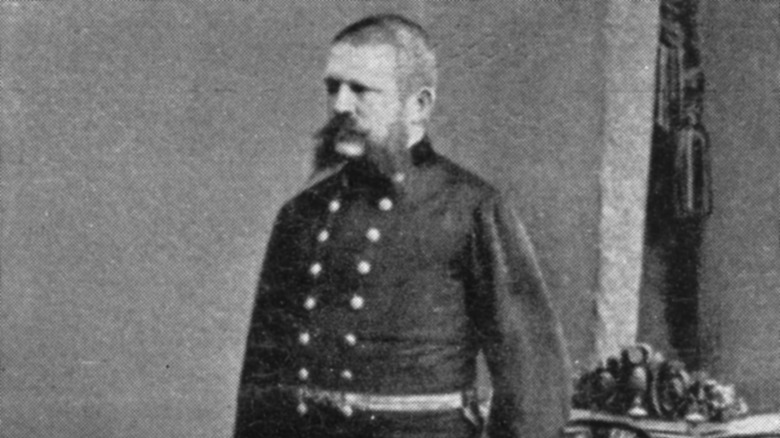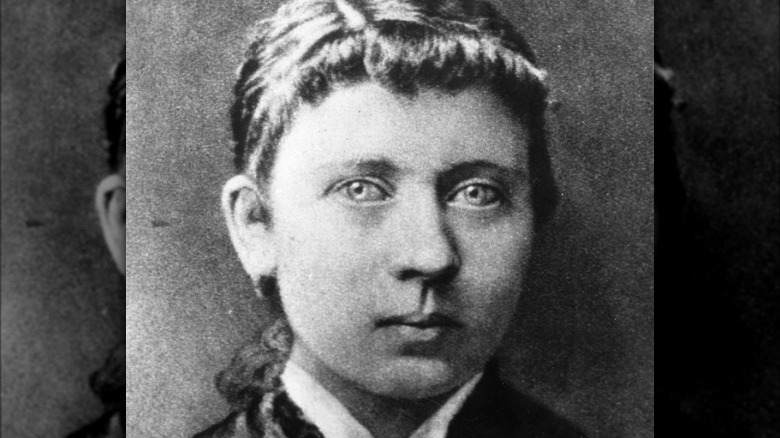Hitler's Parents Had A Closer Connection Than You Realized
When it comes to investigating Adolf Hitler, the man responsible for the deaths of millions of people, no fact is left untouched. This is especially true regarding Hitler's childhood, as many wonder if it may have contributed to his brutal ideology and meteoric rise to power in the 1930s. One interesting aspect of Hitler's upbringing is his family tree. The relationship between Hitler's mother, Klara Pozl, and his father, Alois Hitler, may provide some insight into the strange childhood Hitler experienced. As it turns out, Hitler's parents were second cousins. Other reports indicate that Klara may have been Alois' half-niece.
Whatever the case, the two were related and knew each other as such before their eventual marriage. Klara was brought into her future husband's home as a housemaid, where she worked for him until he married his second wife, Franziska "Fanni" Matzelsberger. When Alois and Matzelsberger married, she asked her husband to dismiss the young maid, whom she saw as a threat to her marriage. He did so, but when Matzelsberger became sick with tuberculosis, Klara returned to his home to assist with his children, Alois Jr. and Angela Hitler.
However, the connection between Alois and Klara was more than just that of second cousins. The age gap between the two was wide enough that Klara could have been Alois' daughter. Despite this, Klara found herself pregnant with his child by the time Matzelsberger died in 1884. Not only that, but Klara referred to him as "Uncle" even after they married.
Hitler was Klara and Alois' only surviving son
Because Klara and Alois were second cousins, they needed permission from the church to marry. Ultimately, the institution gave its approval and the pair walked down the aisle on January 7, 1885. At the time, Klara was heavily pregnant, and after a brief morning ceremony, Alois returned to work. Klara and Alois went on to have six children together. However, Adolf was the first to live past infancy. In fact, Adolf and his sister Paula were the only two of their children to reach adulthood. Because Adolf was Klara's first surviving child, she became very attached to him and doted on her son.
Paula would later describe Klara (via The Washington Post) as "a very soft and tender person" regarding her children. Furthermore, those who knew her described Klara as a quiet and dismissive wife. Her life was dedicated to her children. Nevertheless, Hitler's childhood was anything but ideal. Alois was Klara's complete opposite. He was domineering and moved his family around Austria frequently. He was also violent towards his children and maybe his wife.
"Hitler" by Ian Kershaw (per The New York Times) states that Paula later recounted that when her parents argued, " ... it was always on account of the children. It was especially my brother Adolf who challenged my father to extreme harshness and who got his sound thrashing every day ... How often on the other hand did my mother caress him and try to obtain with her kindness what the father could not succeed [in obtaining] with harshness!"
Hitler's peculiar relationship with his mother
When Alois unexpectedly died in 1903, accounts say that Hitler did not mourn his father. He later admitted that he loved his mother, Klara, but could not say the same about his father. Klara's doctor Eduard Bloch found the mother and son's relationship peculiar. He explained (via The New York Times), "While he was not a 'mother's boy' in the usual sense," he continued, "I have never witnessed a closer attachment." Some have theorized that Hitler developed an Oedipus Complex.
Hitler's close relationship with his mother only fuels this theory. When his mother was diagnosed with breast cancer, he cared for her – cleaning the house, cooking, and performing other tasks. Likewise, Hitler also managed to hold back his anger when he was with Klara, something he struggled with throughout his life. While some theorized that Hitler's violence towards Jews may have resulted from his mother's death, the evidence seems to show otherwise. Klara Hitler died on December 21, 1907, at 47, under the care of the Jewish Dr. Bloch. In fact, following his mother's death, Hitler told Dr. Bloch (via The Washington Post), "I shall be grateful to you forever." In fact, Hitler allowed Dr. Bloch to emigrate to the United States in 1940, referring to him as "the noble Jew" (per The Times of Israel).
Per The New York Times, Bloch later said of Klara's death, "I have never seen anyone so prostrate with grief as Adolf Hitler." In his memoir, "Mein Kampf," Hitler admitted that his mother's death devastated him and ultimately changed the course of his life. Whatever the case, it is no doubt that his parents' unusual connection and upbringing may have contributed to turning Adolf Hitler into the genocidal dictator he became.


